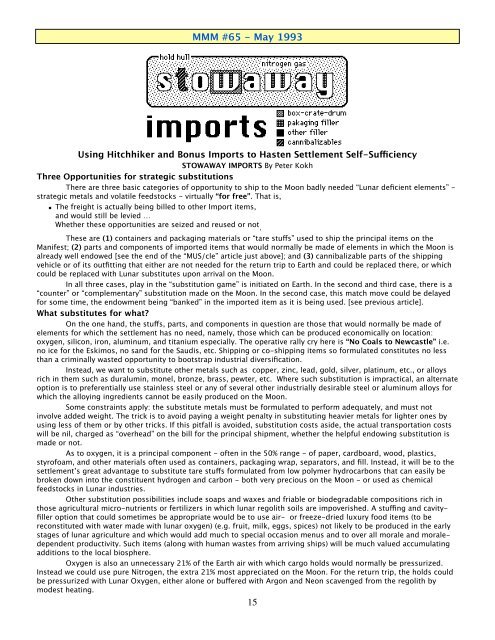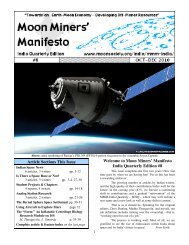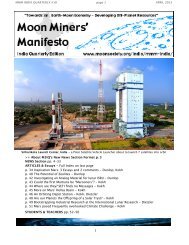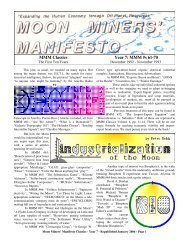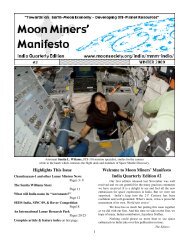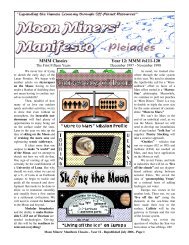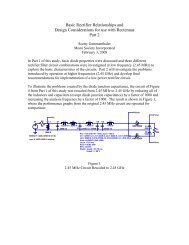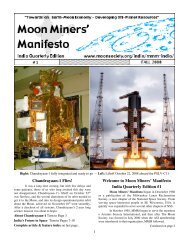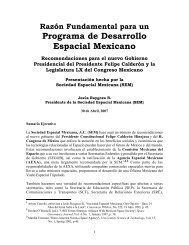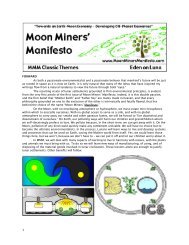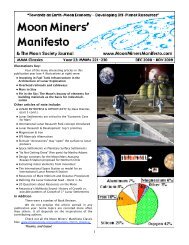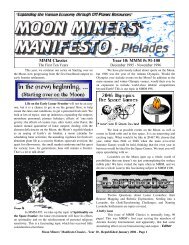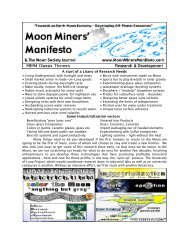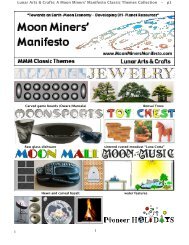Space Transportation - mmmt_transportation.pdf - Moon Society
Space Transportation - mmmt_transportation.pdf - Moon Society
Space Transportation - mmmt_transportation.pdf - Moon Society
Create successful ePaper yourself
Turn your PDF publications into a flip-book with our unique Google optimized e-Paper software.
MMM #65 - May 1993<br />
Using Hitchhiker and Bonus Imports to Hasten Settlement Self-Sufficiency<br />
STOWAWAY IMPORTS By Peter Kokh<br />
Three Opportunities for strategic substitutions<br />
There are three basic categories of opportunity to ship to the <strong>Moon</strong> badly needed “Lunar deficient elements” -<br />
strategic metals and volatile feedstocks - virtually “for free”. That is,<br />
• The freight is actually being billed to other Import items,<br />
and would still be levied …<br />
Whether these opportunities are seized and reused or not<br />
.<br />
These are (1) containers and packaging materials or “tare stuffs” used to ship the principal items on the<br />
Manifest; (2) parts and components of imported items that would normally be made of elements in which the <strong>Moon</strong> is<br />
already well endowed [see the end of the “MUS/cle” article just above]; and (3) cannibalizable parts of the shipping<br />
vehicle or of its outfitting that either are not needed for the return trip to Earth and could be replaced there, or which<br />
could be replaced with Lunar substitutes upon arrival on the <strong>Moon</strong>.<br />
In all three cases, play in the “substitution game” is initiated on Earth. In the second and third case, there is a<br />
“counter” or “complementary” substitution made on the <strong>Moon</strong>. In the second case, this match move could be delayed<br />
for some time, the endowment being “banked” in the imported item as it is being used. [see previous article].<br />
What substitutes for what?<br />
On the one hand, the stuffs, parts, and components in question are those that would normally be made of<br />
elements for which the settlement has no need, namely, those which can be produced economically on location:<br />
oxygen, silicon, iron, aluminum, and titanium especially. The operative rally cry here is “No Coals to Newcastle” i.e.<br />
no ice for the Eskimos, no sand for the Saudis, etc. Shipping or co-shipping items so formulated constitutes no less<br />
than a criminally wasted opportunity to bootstrap industrial diversification.<br />
Instead, we want to substitute other metals such as copper, zinc, lead, gold, silver, platinum, etc., or alloys<br />
rich in them such as duralumin, monel, bronze, brass, pewter, etc. Where such substitution is impractical, an alternate<br />
option is to preferentially use stainless steel or any of several other industrially desirable steel or aluminum alloys for<br />
which the alloying ingredients cannot be easily produced on the <strong>Moon</strong>.<br />
Some constraints apply: the substitute metals must be formulated to perform adequately, and must not<br />
involve added weight. The trick is to avoid paying a weight penalty in substituting heavier metals for lighter ones by<br />
using less of them or by other tricks. If this pitfall is avoided, substitution costs aside, the actual <strong>transportation</strong> costs<br />
will be nil, charged as “overhead” on the bill for the principal shipment, whether the helpful endowing substitution is<br />
made or not.<br />
As to oxygen, it is a principal component - often in the 50% range - of paper, cardboard, wood, plastics,<br />
styrofoam, and other materials often used as containers, packaging wrap, separators, and fill. Instead, it will be to the<br />
settlement’s great advantage to substitute tare stuffs formulated from low polymer hydrocarbons that can easily be<br />
broken down into the constituent hydrogen and carbon - both very precious on the <strong>Moon</strong> - or used as chemical<br />
feedstocks in Lunar industries.<br />
Other substitution possibilities include soaps and waxes and friable or biodegradable compositions rich in<br />
those agricultural micro-nutrients or fertilizers in which lunar regolith soils are impoverished. A stuffing and cavityfiller<br />
option that could sometimes be appropriate would be to use air- or freeze-dried luxury food items (to be<br />
reconstituted with water made with lunar oxygen) (e.g. fruit, milk, eggs, spices) not likely to be produced in the early<br />
stages of lunar agriculture and which would add much to special occasion menus and to over all morale and moraledependent<br />
productivity. Such items (along with human wastes from arriving ships) will be much valued accumulating<br />
additions to the local biosphere.<br />
Oxygen is also an unnecessary 21% of the Earth air with which cargo holds would normally be pressurized.<br />
Instead we could use pure Nitrogen, the extra 21% most appreciated on the <strong>Moon</strong>. For the return trip, the holds could<br />
be pressurized with Lunar Oxygen, either alone or buffered with Argon and Neon scavenged from the regolith by<br />
modest heating.<br />
15


